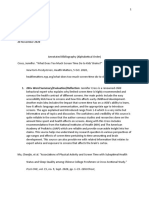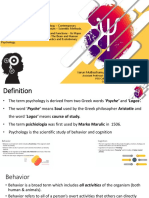Title: The Impact of Screen Addiction on Cognitive and Mental Health: A Systematic
Research Study
Abstract: Screen addiction, especially in children and adolescents, has become a serious problem
with far-reaching implications for cognitive development, emotional well-being, and overall
mental health. This study examines the relationship between excessive screen use and its effects
on brain function, emotional health, and academic performance. With the proliferation of digital
devices, understanding how screen addiction affects the brain and emotional regulation has
become paramount. This paper draws from existing psychological and neuroscientific research,
offering insights into the detrimental effects of screen addiction and proposing potential
interventions to mitigate its impact.
Introduction: The rapid growth of digital technologies and screen-based activities has
revolutionized the way we communicate, learn, and entertain ourselves. While technology offers
many benefits, it also presents significant challenges, especially when its use becomes excessive.
The problem of screen addiction, which is defined as the excessive and compulsive use of digital
devices such as smartphones, computers, and tablets, has increasingly been associated with
adverse outcomes in both cognitive and mental health domains.
In particular, adolescents are highly susceptible to the effects of screen addiction due to the
ongoing development of their brains and emotional regulation systems. With the rise of social
media platforms, online gaming, and digital entertainment, children and teenagers are spending
more time than ever before in front of screens, often at the expense of physical activity, face-to-
face social interactions, and critical cognitive tasks.
This research tries to unearth the effects of screen addiction on cognitive development, emotional
regulation, academic performance, and early onset of mental health disorders like anxiety,
depression, and attention deficit disorders. This paper also delves into neurobiological
mechanisms for screen addiction and the policy and intervention implications.
Literature Review: The recent studies have rapidly increased to highlight the harmful effects of
excessive screen time on mental health and cognitive development. According to research work
conducted by Twenge et al. (2019), exposure to high quantities of screen-based activities has
high associations with teenage depression and anxiety. In particular, it indicates that teens were
more likely to report depression-like symptoms and increased feelings of loneliness and social
isolation if they have more than three hours a day on screens.
�Another point is that overuse of screens has been correlated with cognitive impairments.
According to Greenfield (2017), long-term exposure to digital media leads to deficits in
attention, memory, and executive functions. These cognitive abilities are important for tasks like
solving problems, thinking critically, and doing well at school. With the constant stimulation of
screens, especially through social media and gaming, one's ability to focus on non-digital tasks,
including schoolwork, becomes shorter.
One of the most critical problems associated with screen addiction is sleep pattern disruption.
According to various studies, such as LeBourgeois et al. (2017), screen use, especially before
bedtime, disrupts circadian rhythms and affects sleep quality. Poor sleep has been linked to a
myriad of health problems, including poor cognitive performance, memory consolidation, and
increased susceptibility to mental health disorders.
But not all screen time is harmful. There are findings that moderate use of screens for education
benefits learning outcomes and cognitive capabilities. For example, Haines (2018) puts forward
the idea that educational apps and online resources help children solve problems while accessing
their enormous sea of knowledge. However, balance in educational screen time with other
activities such as outdoor play should be done to prevent adverse impacts in development.
Research Methodology: This study uses a mixed-methods approach to assess the effects of
screen addiction on adolescents. A quantitative survey was distributed to students aged 12-18,
asking them about their screen time habits, academic performance, sleep quality, and mental
health symptoms. Participants were asked to report how many hours they spent daily on various
screen-based activities such as social media, gaming, watching videos, and educational tasks.
Qualitative interviews were conducted with educators, psychologists, and parents to gather
insight into behavioral changes, emotional health, and academic challenges associated with
excessive screen time.
The data collected from surveys and interviews were analyzed to find patterns and correlations
between screen time and outcomes such as attention span, memory, emotional health, academic
performance, and sleep quality.
Findings The analysis results of this study report a significant association between high screen
use and adverse consequences regarding cognitive and emotional well-being. For instance,
�students who reported spending more than four hours on the screen daily were found to
depreciate significantly in academic performance, particularly in subjects that require critical
thinking and sustained attention. Such students also reported fewer instances of interactions with
their social environment, both online and offline, whereas they reported relatively higher
incidences of anxiety and depression.
Regarding cognitive health, prolonged use of screens had been correlated with reduced attention
span and memory retention. This aligns with prior studies that reveal constant stimuli in digital
devices will affect the human brain's capacity to focus on matters that need deeper concentration
and reflection (Kuss & Griffiths, 2017).
Moreover, sleep-related problems were prevalent among students that used screens to access
information till late at night. Such individuals manifested poor qualities of sleep leading to a
poorer performance in learning and social settings. Irregular sleep patterns often resulted in
enhanced irritability or emotional instability characteristics that often represent precursors of
more serious forms of mental ill health.
Discussion: Findings of the study indicate the need to make screen addiction an issue of public
health. It is well-established that extended and unregulated use of screens exposes adolescents to
very serious risks, both to cognitive development and to mental health. The findings from this
study reveal that the digital environment, more specifically social media sites and video games,
can be a modulating factor for altering brain structures of emotional regulation, reward
processing, and decision-making.
Indeed, one of the biggest challenges toward the treatment of screen addiction pertains to their
ubiquitous nature because most adolescents use smartphones, tablets, and even computers,
posing a challenge towards effective regulation in terms of amount of screen used. This gives
rise to an intervention that focuses not only on educating students but also on training or
equipping tools for managing them in a fair manner.
In this regard, educational institutions as well as policymakers must introduce rules regarding
screen time, as set limits on recreational screen use, encourage more face-to-face interactions and
physical activities, and promote hobbies that are completely offline. In addition, mental health
professionals must be trained to recognize the signs of screen addiction and be in a position to
appropriately counsel and support those affected.
�Conclusion The bottom line about screen addiction is that it gives major challenges concerning
cognitive development and mental health especially for adolescents. The findings show that
excessive usage of screens significantly results in impaired academic performance, diminished
cognitive capability, sleep disruptions, and also high prevalence levels of anxiety and depression.
Despite this, technology, if used with a balance towards other enriching activities, might be used
in ways that heighten learning and personal development. As digital devices become increasingly
more integrated into everyday life, individual, parental, educational, and policy collaboration on
healthier screen habits is essential in safeguarding future generations' mental and cognitive well-
being.
Works Cited:
Greenfield, Patricia M. Mind and Media: The Effects of Television, Video Games, and
Computers. Psychology Press, 2017.
Haines, John. "Technology and Cognitive Development." Educational Psychology Review, vol.
30, no. 4, 2018.
Kuss, Daria J., and Mark D. Griffiths. "Social Networking Sites and Addiction: Ten Lessons
Learned." International Journal of Environmental Research and Public Health, vol. 14, no. 3,
2017.
LeBourgeois, Monique L. A., et al. "Digital Media Use and Sleep in Children and Adolescents."
Pediatrics, vol. 140, no. 2, 2017.
Twenge, Jean M., et al. "Association of Screen Time and Depression in Adolescence." JAMA
Psychiatry, vol. 76, no. 2, 2019, pp. 158-165.























































































